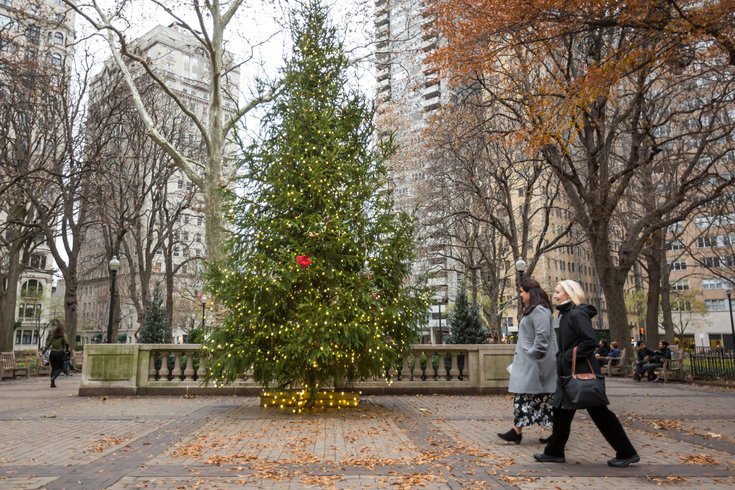
December 15, 2021
 Thom Carroll/For PhillyVoice
Thom Carroll/For PhillyVoice
A spike in COVID-19 cases after Thanksgiving has prompted Philadelphia officials to recommend against family gatherings on Christmas this year.
The Philadelphia health department is strongly cautioning residents against attending Christmas gatherings this year as the city enters another apparent winter surge of COVID-19 cases.
Health Commissioner Dr. Cheryl Bettigole stressed Wednesday that holiday events, especially those held indoors and without masks, are a big driver in the spread of the virus.
"Our contact tracing tells us that these gatherings, when we get together with friends and family, are when we infect each other with COVID," Bettigole said. "We saw it with Thanksgiving, and I worry that the people who were getting together then likely contributed to the rise in cases we're seeing now."
COVID-19 cases in Philadelphia have been on a fairly steep upward trend since late November.
The city has averaged 544 new cases per day over the last two weeks, which is double the average recorded at the beginning of December. The test positivity rate stood at approximately 5.2% over the same period, nearly as high as the peak seen last spring.
On Monday, the health department reported that 368 patients with COVID-19 were being treated in Philadelphia hospitals, including 42 on ventilators. One month ago, there were 171 people being treated for COVID-19 in city hospitals. The majority of these patients were not vaccinated, officials said.
"Our worry, as it always has been, is not just about people testing positive," Bettigole said. "We're trying to keep our hospitals from being overwhelmed."
While skipping Christmas gatherings may seem "unfair" to those who have followed guidelines throughout the pandemic, the high level of transmission seen with the delta variant and the emerging omicron variant, even among vaccinated people, has changed the landscape, Bettigole said.
"Please do not get together with other households for Christmas, or if you do, keep those gatherings small, have everyone get a rapid test before they come, and ask everyone to stay home if they feel even a little bit unwell," Bettigole said. "Please do not hold or attend holiday parties indoors. It's just too dangerous."
Even families who are fully vaccinated and may already have gotten booster shots are advised to exercise caution.
"If everyone has been vaccinated and boosted, they're clearly safer than families that have somebody who isn't vaccinated, for whatever reason," Bettigole said. "We do still have some risk of breakthrough, and there's clearly some risk of breakthrough with omicron. We're asking that people be cognizant of the risk they're taking."
Bettigole suggested that families that are fully vaccinated still consider getting rapid tests before a gathering, particularly if somebody attending the event is at high risk, or if guests are likely to see a person at high-risk after Christmas.
The city's holiday guidance is somewhat at odds with the upcoming vaccine mandate at indoor dining establishments. Beginning early next year, all patrons and staff will be required to show proof that they have been fully vaccinated. In those settings, vaccinated people will be indoors and eating around strangers, which appears to be no better or worse than a family gathering under the same circumstances.
But the health department said Wednesday that two-thirds of people who have been interviewed after testing positive for COVID-19 have attributed their illnesses to spread within their household, where they spend longer periods of time potentially exposed, compared to less than one-quarter who said their infections came from social and other gatherings.
On Monday, Bettigole explained that the vaccine mandate is an approach to keep businesses open while decreasing the likelihood of COVID-19 transmission occurring in these settings during an anticipated winter surge.
The city's monitoring of the omicron variant remains limited, but two out of three known cases have been linked to community spread. The omicron variant is believed to be even more infectious than delta, though it preliminary data suggests it may cause milder illnesses.
"It's clear that we have more cases that we're not picking up," Bettigole said.
Nationally, just under 3% of known COVID-19 cases are caused by the omicron variant. In some locations, such as New York and New Jersey, that number is as high as 13%.
"It's still, as far as we can tell, the minority of cases in the city," Bettigole said. "But it's going to spread fairly quickly."
Wednesday marked the one-year anniversary of Philadelphia beginning to administer COVID-19 vaccines, a mark of progress that Bettigole said has kept residents safe.
More than 95% of adults, 88% of people age 12 and up, and 18.2% of children ages 5-11 have received at least one shot. The percentage of children who have gotten at least one dose has doubled in the last two weeks. More than 76% of adults and 70% of children ages 12 and up are fully vaccinated, and more than 182,000 Philadelphia residents have had a booster shot.
Bettigole recommended all eligible residents get a booster shot as soon as possible.
"Boosters have been shown not only to up the protection against the delta and omicron variants, but also to help make you less likely to spread COVID if you do become infected," Bettigole said.